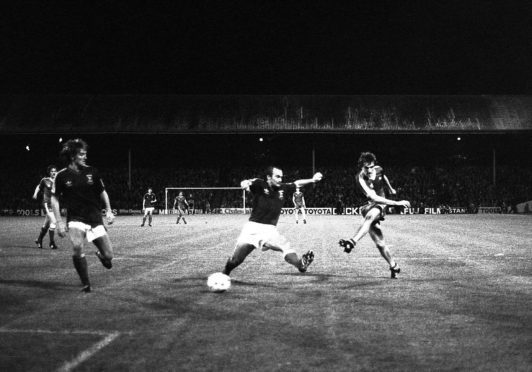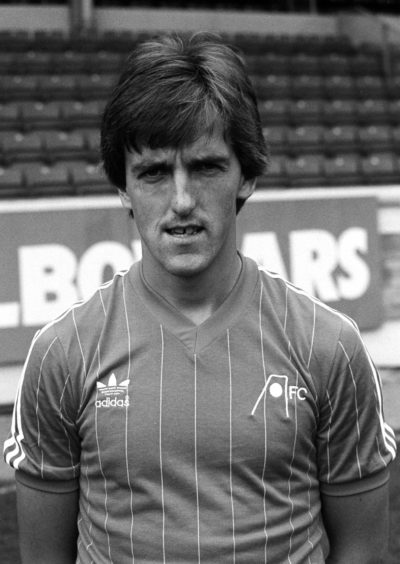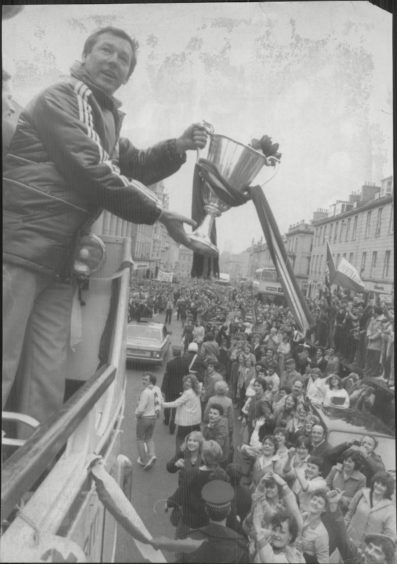The history books will forever record that Aberdeen ascended to European Cup Winners’ Cup glory in 1983 after beating Real Madrid in Gothenburg.
It was an unforgettable triumph for the Dons, who had developed into a powerful, passionately committed ensemble under the tutelage of Alex Ferguson.
Yet, if the crowning moment arrived in the pouring rain of Sweden, the initial seeds of that success were sown 40 years ago this week when Pittodrie hosted a Battle of Britain contest with reigning Uefa Cup winners Ipswich Town – and sent Bobby Robson’s side crashing out of the tournament they had won just four months earlier.
The Suffolk team had a string of internationalists including Dutch duo Arnold Muhren and Frans Thijssen, Scotland’s John Wark and Alan Brazil, and England internationals Terry Butcher, Paul Mariner, Russell Osman and Mick Mills.
But, although they were favourites in the build-up, the Scots were undaunted and gained an impressive 1-1 draw in the first leg at Portman Road, boosted by a second-half goal from John Hewitt. It was a result which offered Aberdeen supporters a lip-smacking encounter at Pittodrie on September 30 1981.
The contest stirred people’s imaginations and sparked a clamour for tickets. Even the normally urbane Robson – one of the sport’s gentlemen and a father figure to so many leading footballers – was caught up in the pre-match hype.
As the former Aberdeen Journals writer Jack Webster said: “There was an element of surprise about the Robson eyebrows when his men were held in the opening leg.
“But then, with that southern arrogance which often irks the Scots, Robson expressed doubts that Aberdeen could play any better when the sides met again.
Robson fired up Aberdeen players
“The presumption was that his own team would step up their performance and make their way through to the second round of the competition.”
It was a red rag to the bullish Ferguson and meant he didn’t need to stir his men with Churchillian rhetoric when the combatants lined up at a partisan Pittodrie.
The fixture generated plenty of attention across Europe. Even five years earlier, the notion of Aberdeen and Ipswich becoming European giants would have been ridiculed as cloud-cuckoo-land material by the majority of people, but times had changed.
So, too, Pittodrie was acquiring a taste for these big occasions when the stadium was rocking and the crowds streamed down Merkland Road on that last day of September.
Penalties from Gordon Strachan and Wark maintained the deadlock at half-time, but Aberdeen once again offered plenty of threat and all it required was for somebody to step up and stamp their imprint after the interval.
And cometh the hour, that force of nature turned out to be Peter Weir, the talented but inconsistent performer who had previously been struggling to live up to the expectations of his significant – at the time – £300,000 transfer from St Mirren.
When the action resumed, he was a ubiquitous figure, and had decided that he could leave Mick Mills clutching at shadows if he regularly ran at him at pace.
It was a bold strategy, one which paid almost immediate dividends, and the more possession that Weir received, the greater his impact on the contest.
Weir weaved his way round Mills
Webster was among those who marvelled at the spectacle. As he wrote: “Suddenly, in that second period, he began to show his real power, surging relentlessly at Mick Mills with such tantalising skill as to throw the international defender into total confusion.
“It was no surprise when he scored to put Aberdeen 2-1 in front, and that welcome event was tempered only by the lurking thought that an Ipswich equaliser might put them through on the away-goal rule.
“But if that fear existed, Weir was having none of it. Running once more at Mills, he sealed the match for Aberdeen with a third goal, which not only dismissed the cup winners in the first round, but rang alarm bells across Europe and sent out the message that a team from the north-east of Scotland was on the march.”
To his credit, Robson acknowledged that the Dons had amply merited their success and wished them well for the remainder of the tournament.
Paul Mariner, for his part, added: “Take nothing away from Aberdeen at all. The spine of that side was very good and when you have players like Peter Weir, who had an absolute stormer of a game, it changes everything.
“Peter had pace, he had a good touch, and he could go down both sides. For a full-back coming up against that style of player, it was a recipe for disaster.”
Dons aficionados who couldn’t secure tickets had to wait until 10.40pm to discover if their heroes had progressed. With no live coverage, the highlights were screened on Grampian’s Midweek Sports Special, where football shared the bill with gymnastics.
Ferguson’s team disposed of Romania’s Arges Pitesti in the next round, but their UEFA run ended when they were edged out 5-4 on aggregate by Hamburg. Yet, if there was disappointment, there was also a growing confidence about competing against the best.
There might have been no European prizes that season, but the stars aligned when IFK Goteborg demolished the Germans 4-0 in the final, contested over two legs.
Yes, Gothenburg and Hamburg. Two names which have become inextricably linked with the greatest achievements in Aberdeen’s history.












